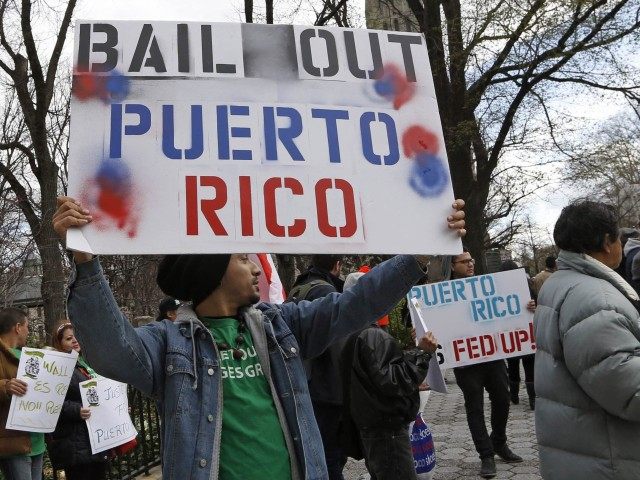Despite Congress being ready to pass special legislation to restructure its $70 billion in debt, the Governor of Puerto Rico announced that the U.S. Territory will default on July 1.
Commonwealth of Puerto Rico Governor Alejandro Garcia Padilla, who has trouble speaking English, posted an editorial on a CNBC website stating, “On July 1, 2016, Puerto Rico will default on more than $1 billion in general obligation bonds, the island’s senior credits protected by a constitutional lien on revenues.”
The island has been called the “Oldest Colony in the World,” but it has enough state-like attributes to be an official “territory,” in order to avoid the UN designation of colony.
But from a legal standpoint, that difference means Puerto Rico cannot file for bankruptcy under federal Chapter 9 Bankruptcy Law, like the State of Arkansas did in 1933. Before the bankruptcy laws were passed, the “Panic of 1837” caused Illinois, Indiana, Maryland, Michigan, Pennsylvania, Arkansas, Louisiana, and the Territory of Florida to default.
With $13 billion of general-obligation debt outstanding, and $2 billion of principal and interest due on July 1, Padilla previously stated that the commonwealth could not raise enough cash to cover the payment, even if he were to shut down all government operations.
The fear of a default caused Republicans in Congress to hammer out a bill that would give Puerto Rico the ability to cut its debt and put a hold on bondholder lawsuits that could jeopardize its ability to pay for schools, police officers and health care. Claiming the bill is not a “bailout,” the Senate voted 68-32 on June 29 to pass legislation that was expected to be approved by the House just in time to avoid a default.
A key reason’s Puerto Rico’s economy has imploded is that the Popular Democratic Party-controlled legislature made Spanish the official language for all schools and government use in 1991. Partly as a result, 86 percent of the island does not speak English in the home, and almost a third of the residents are on welfare. Poor language skills are the major impediment to relocating call-centers and other U.S. service businesses to Puerto Rico.
Because the interest on municipal bonds is federally tax exempt, individuals tend to be the largest holders of municipal bond debt in the United States. That is why millions of non-Puerto Ricans own about a third of the island’s debt as individuals or through small investor holdings in 377 bond mutual funds, according to data from Morningstar.
A few local individuals own the island’s bonds, but most of the one-third held by “ordinary Puerto Ricans” are through crony investments by the island’s ruling Popular Democratic Party (PDP)-controlled credit unions.
The other third of Puerto Rico’s debt has been bought up by hedge funds at about 50 cents-on-the-dollar. Unlike conservative investors, who try to lock in long-term retirement income, hedge funds are willing to make high-risk speculative investments in search of high-short-term-gains.
Before Puerto Rico asked Congress to give it the right to file for bankruptcy, it tried to convince bondholders that it was in their “best interest” to exchange all their bonds into between 73 cents on-the-dollar and 39 cents-on-the-dollar in so-called “Base Bonds,” with returns depending on payment priority. The new bonds would supposedly receive asset liens on facilities and priority interest payments from tax streams.
But few bondholders seemed interested in taking such massive haircuts on their debt. As Breitbart News outlined in October, after the proposed debt exchange, Puerto Rico intended to issue even more bonds, rather than cutting spending.

COMMENTS
Please let us know if you're having issues with commenting.